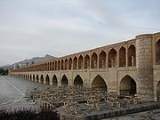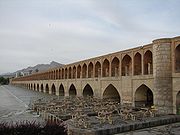
Allahverdi Khan
Encyclopedia
Allahverdi Khan (ca. 1560 – June 3, 1613) was an Iranian general and statesman of Georgian
origin who, although initially a ghulām (royal court military servant), rose to high office in the Safavid state
.
Allahverdi was born a Christian
Georgia
n, surnamed Undiladze
, and, like many of his compatriots and fellow Christian Armenians
and Circassians, was taken prisoner in the course of one of the Caucasian
campaigns of Shah
Abbas I of Persia
and converted to Islam
to be trained for service in the ghulam army, a special military structure consisting of Christian captives and created by Abbas I to counterpoise the power of the Turkic Kizilbash
, which constituted the nucleus of he Safavid military aristocracy.
In 1589, he took part in the assassination of the powerful minister (wakil) and kingmaker Morshed-Kholi Khan Ostaglu, who was secretly condemned to death by Shah Abbas. As a result, he was made sultan
and a governor of Jorpadagan near Isfahan, the Safavid capital. He then rapidly rose to higher offices and was appointed commander of the ghulam army, thus becoming one of the five principal officers in the Safavid administration by 1595/6. In the same year, Abbas appointed him the governor of Fars, a move that made him the fist ghulam to attain equal status with the Kizilbash emir
s. This act also meant that the large provinces would no longer be administered by semi-autonomous and frequently self-minded Kizilbash emirs, but by officers appointed directly by the shah.
 In 1596/7, he was transferred to the governorship of Kohgiluyeh. In August 1598, Allahverdi Khan, as a sardar-e-lashkar (commander-in-chief), was instrumental in recovering Herat
In 1596/7, he was transferred to the governorship of Kohgiluyeh. In August 1598, Allahverdi Khan, as a sardar-e-lashkar (commander-in-chief), was instrumental in recovering Herat
from the Uzbek
tribes and shortly after this victory was ordered by the shah to put a powerful Kizilbash emir Farhad Khan Qaramanli to death. This act turned Allahverdi Khan into the most powerful man in the Persian Empire after the shah. From 1600 onwards, counseled by the English
gentleman of fortune, Sir Robert Sherley, he reorganized the army and strengthened it by increasing the number of ghulam troops from 4,000 to 25,000.
Allahverdi Khan led the Persian armies in a number of successful campaigns on both the eastern and the western frontiers of the Safavid empire, including the 1601-2 conquest of Bahrain
.
He is also remembered for having constructed a number of public buildings, including the well-known Pol-e Sio-Seh
bridge across the Zayandeh River in Isfahan which bears his name to this day, and charitable foundations.
Georgians in Iran
Iranian Georgians are an ethnic group living in Iran. Today's Georgia was a subject to the Safavid empire in 17th century and Shah Abbas I relocated communities of Christian, Muslim, and Georgian Jews as part of his programs to develop industrial economy, strengthen the military and populate newly...
origin who, although initially a ghulām (royal court military servant), rose to high office in the Safavid state
Safavid dynasty
The Safavid dynasty was one of the most significant ruling dynasties of Iran. They ruled one of the greatest Persian empires since the Muslim conquest of Persia and established the Twelver school of Shi'a Islam as the official religion of their empire, marking one of the most important turning...
.
Allahverdi was born a Christian
Christian
A Christian is a person who adheres to Christianity, an Abrahamic, monotheistic religion based on the life and teachings of Jesus of Nazareth as recorded in the Canonical gospels and the letters of the New Testament...
Georgia
Georgians
The Georgians are an ethnic group that have originated in Georgia, where they constitute a majority of the population. Large Georgian communities are also present throughout Russia, European Union, United States, and South America....
n, surnamed Undiladze
Undiladze
The Undiladze were a Georgian noble family whose members rose in prominence in the service of Iran’s Safavid dynasty and dominated the Shah’s court at a certain period of the late 16th and early 17th centuries....
, and, like many of his compatriots and fellow Christian Armenians
Armenians
Armenian people or Armenians are a nation and ethnic group native to the Armenian Highland.The largest concentration is in Armenia having a nearly-homogeneous population with 97.9% or 3,145,354 being ethnic Armenian....
and Circassians, was taken prisoner in the course of one of the Caucasian
Caucasus
The Caucasus, also Caucas or Caucasia , is a geopolitical region at the border of Europe and Asia, and situated between the Black and the Caspian sea...
campaigns of Shah
Shah
Shāh is the title of the ruler of certain Southwest Asian and Central Asian countries, especially Persia , and derives from the Persian word shah, meaning "king".-History:...
Abbas I of Persia
Abbas I of Persia
Shāh ‘Abbās the Great was Shah of Iran, and generally considered the greatest ruler of the Safavid dynasty. He was the third son of Shah Mohammad....
and converted to Islam
Islam
Islam . The most common are and . : Arabic pronunciation varies regionally. The first vowel ranges from ~~. The second vowel ranges from ~~~...
to be trained for service in the ghulam army, a special military structure consisting of Christian captives and created by Abbas I to counterpoise the power of the Turkic Kizilbash
Kizilbash
Qizilbash or Kizilbash is the label given to a wide variety of Shī‘ī Islamic militant groups that flourished in Anatolia and Kurdistan from the late 13th century onwards, some of which contributed to the foundation of the Safavid dynasty of...
, which constituted the nucleus of he Safavid military aristocracy.
In 1589, he took part in the assassination of the powerful minister (wakil) and kingmaker Morshed-Kholi Khan Ostaglu, who was secretly condemned to death by Shah Abbas. As a result, he was made sultan
Sultan
Sultan is a title with several historical meanings. Originally, it was an Arabic language abstract noun meaning "strength", "authority", "rulership", and "dictatorship", derived from the masdar سلطة , meaning "authority" or "power". Later, it came to be used as the title of certain rulers who...
and a governor of Jorpadagan near Isfahan, the Safavid capital. He then rapidly rose to higher offices and was appointed commander of the ghulam army, thus becoming one of the five principal officers in the Safavid administration by 1595/6. In the same year, Abbas appointed him the governor of Fars, a move that made him the fist ghulam to attain equal status with the Kizilbash emir
Emir
Emir , meaning "commander", "general", or "prince"; also transliterated as Amir, Aamir or Ameer) is a title of high office, used throughout the Muslim world...
s. This act also meant that the large provinces would no longer be administered by semi-autonomous and frequently self-minded Kizilbash emirs, but by officers appointed directly by the shah.

Herat
Herāt is the capital of Herat province in Afghanistan. It is the third largest city of Afghanistan, with a population of about 397,456 as of 2006. It is situated in the valley of the Hari River, which flows from the mountains of central Afghanistan to the Karakum Desert in Turkmenistan...
from the Uzbek
Uzbeks
The Uzbeks are a Turkic ethnic group in Central Asia. They comprise the majority population of Uzbekistan, and large populations can also be found in Afghanistan, Tajikstan, Kyrgyzstan, Turkmenistan, Kazakhstan, Russia, Pakistan, Mongolia and the Xinjiang Uyghur Autonomous Region of China...
tribes and shortly after this victory was ordered by the shah to put a powerful Kizilbash emir Farhad Khan Qaramanli to death. This act turned Allahverdi Khan into the most powerful man in the Persian Empire after the shah. From 1600 onwards, counseled by the English
England
England is a country that is part of the United Kingdom. It shares land borders with Scotland to the north and Wales to the west; the Irish Sea is to the north west, the Celtic Sea to the south west, with the North Sea to the east and the English Channel to the south separating it from continental...
gentleman of fortune, Sir Robert Sherley, he reorganized the army and strengthened it by increasing the number of ghulam troops from 4,000 to 25,000.
Allahverdi Khan led the Persian armies in a number of successful campaigns on both the eastern and the western frontiers of the Safavid empire, including the 1601-2 conquest of Bahrain
Bahrain
' , officially the Kingdom of Bahrain , is a small island state near the western shores of the Persian Gulf. It is ruled by the Al Khalifa royal family. The population in 2010 stood at 1,214,705, including 235,108 non-nationals. Formerly an emirate, Bahrain was declared a kingdom in 2002.Bahrain is...
.
He is also remembered for having constructed a number of public buildings, including the well-known Pol-e Sio-Seh
33 pol
Si-o-se Pol , also called the Allah-Verdi Khan Bridge, is one of the eleven bridges of Isfahan, Iran. It is highly ranked as being one of the most famous examples of Safavid bridge design....
bridge across the Zayandeh River in Isfahan which bears his name to this day, and charitable foundations.
See also
- Imam-quli KhanImam-Quli KhanImam-Quli Khan was an Iranian military and political leader of Georgian origin who served as a governor of Fars, Lar and Bahrain for the shahs Abbas I and Safi.-Biography:...
, his son - Daud KhanDaud Khan UndiladzeDaud-Khan an Iranian military commander and politician of Georgian origin who served as governor of Ganja and Karabakh from 1625 to 1630....
, his son - Georgians in IranGeorgians in IranIranian Georgians are an ethnic group living in Iran. Today's Georgia was a subject to the Safavid empire in 17th century and Shah Abbas I relocated communities of Christian, Muslim, and Georgian Jews as part of his programs to develop industrial economy, strengthen the military and populate newly...

